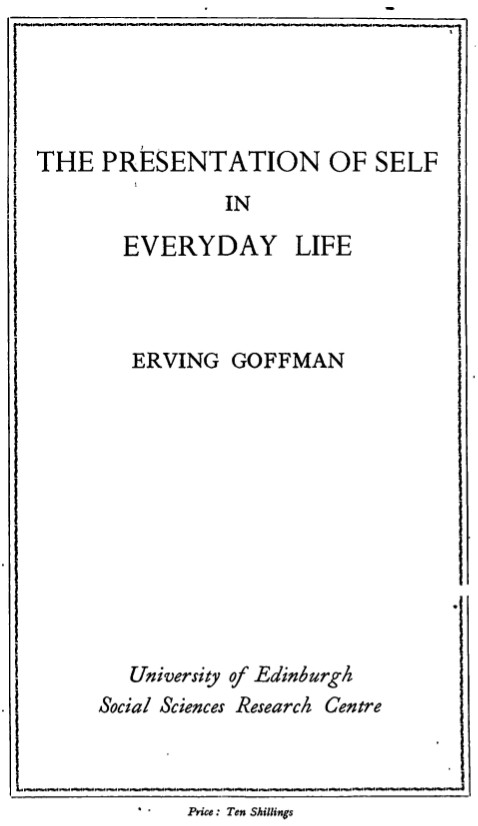Roberto Esposito: The Third Person: Politics of Life and Philosophy of the Impersonal (2007/2012)
Filed under book | Tags: · animal, anthropology, biology, biopolitics, life, nazism, personhood, philosophy, politics, subjectivity

All discourses aimed at asserting the value of human life as such–whether philosophical, ethical, or political–assume the notion of personhood as their indispensable point of departure. This is all the more true today. In bioethics, for example, Catholic and secular thinkers may disagree on what constitutes a person and its genesis, but they certainly agree on its decisive importance: human life is considered to be untouchable only when based on personhood. In the legal sphere as well the enjoyment of subjective rights continues to be increasingly linked to the qualification of personhood, which appears to be the only one capable of bridging the gap between human being and citizen, right and life, and soul and body opened up at the very origins of Western civilization.
The radical and alarming thesis put forward in this book is that the notion of person is unable to bridge this gap because it is precisely what creates this breach. Its primary effect is to create a separation in both the human race and the individual between a rational, voluntary part endowed with particular value and another, purely biological part that is thrust by the first into the inferior dimension of the animal or the thing. In opposition to the performative power of the person, whose dual origins can be traced back to ancient Rome and Christianity, Esposito pursues his strikingly original and innovative philosophical inquiry by inviting reflection on the category of the impersonal: the third person, in removing itself from the exclusionary mechanism of the person, points toward the orginary unity of the living being.
First published in Italian as Terza Persona, Giulio Einaudi, 2007
Translated by Zakiya Hanafi
Publisher Polity, 2012
ISBN 0745643981, 9780745643984
200 pages
Isabelle Stengers: Cosmopolitics (1996-97–) [FR, EN]
Filed under book | Tags: · artificial life, cosmopolitics, ecology, history of science, knowledge, life, modernity, philosophy, philosophy of science, physics, politics, quantum mechanics, science, theory, time


Cosmopolitics I.
“From Einstein’s quest for a unified field theory to Stephen Hawking’s belief that we ‘would know the mind of God’ through such a theory, contemporary science—and physics in particular—has claimed that it alone possesses absolute knowledge of the universe. In a sweeping work of philosophical inquiry, originally published in French in seven volumes, Isabelle Stengers builds on her previous intellectual accomplishments to explore the role and authority of science in modern societies and to challenge its pretensions to objectivity, rationality, and truth.
For Stengers, science is a constructive enterprise, a diverse, interdependent, and highly contingent system that does not simply discover preexisting truths but, through specific practices and processes, helps shape them. She addresses conceptual themes crucial for modern science, such as the formation of physical-mathematical intelligibility, from Galilean mechanics and the origin of dynamics to quantum theory, the question of biological reductionism, and the power relations at work in the social and behavioral sciences. Focusing on the polemical and creative aspects of such themes, she argues for an ecology of practices that takes into account how scientific knowledge evolves, the constraints and obligations such practices impose, and the impact they have on the sciences and beyond.
This perspective, which demands that competing practices and interests be taken seriously rather than merely (and often condescendingly) tolerated, poses a profound political and ethical challenge. In place of both absolutism and tolerance, she proposes a cosmopolitics—modeled on the ideal scientific method that considers all assumptions and facts as being open to question—that reintegrates the natural and the social, the modern and the archaic, the scientific and the irrational.”
Cosmopolitics I includes the first three volumes of the original work: The Science Wars; The Invention of Mechanics; and Thermodynamics.
Cosmopolitics II
“Arguing for an “ecology of practices” in the sciences, Isabelle Stengers explores the discordant landscape of knowledge derived from modern science, seeking intellectual consistency among contradictory, confrontational, and mutually exclusive philosophical ambitions and approaches. For Stengers, science is a constructive enterprise, a diverse, interdependent, and highly contingent system that does not simply discover preexisting truths but, through specific practices and processes, helps shape them.
Stengers concludes this philosophical inquiry with a forceful critique of tolerance; it is a fundamentally condescending attitude, she contends, that prevents those worldviews that challenge dominant explanatory systems from being taken seriously. Instead of tolerance, she proposes a “cosmopolitics” that rejects politics as a universal category and allows modern scientific practices to peacefully coexist with other forms of knowledge.
Cosmopolitics II includes the first English-language translations of the last four books: Quantum Mechanics: The End of the Dream; In the Name of the Arrow of Time: Prigogine’s Challenge; Life and Artifice: The Faces of Emergence; and The Curse of Tolerance. ”
French edition
Publisher La Découverte; Le Plessis-Robinson (Essonne): Synthélabo, Paris, 1996, 1997
English edition
Translated by Robert Bononno
Publisher University of Minnesota Press, 2010, 2011
Posthumanities series
ISBN 0816656878, 9780816656875 (Vol. I)
ISBN 0816656894, 9780816656899 (Vol. II)
312 and 472 pages
Reviews: Steven Shaviro, Michael Halewood (Radical Philosophy).
Author’s lecture on Cosmopolitics, video.
Publisher (EN/1)
Publisher (EN/2)
Cosmopolitiques I: La Guerre des sciences (French, Nov 1996)
Cosmopolitiques III: Thermodynamique: la réalité physique en crise (French, Jan 1997)
Cosmopolitiques VI: La Vie et l’Artifice: visages de l ‘émergence (French, Apr 1997)
Cosmopolitiques VII: Pour en finir avec la tolérance (French, May 1997)
Cosmopolitics I (1-3) (English)
Cosmopolitics II (4-7) (English)
Erving Goffman: The Presentation of Self in Everyday Life (1956)
Filed under book | Tags: · everyday, life, social theory, sociology, theatre

“The Presentation of Self in Everyday Life is a seminal sociology book by Erving Goffman. It uses the imagery of the theatre in order to study human behavior in social situations and the way we appear to others. Discussions of social techniques are based upon detailed research and observation of social customs in many regions.”
Publisher University of Edinburgh, 1956
162 pages

